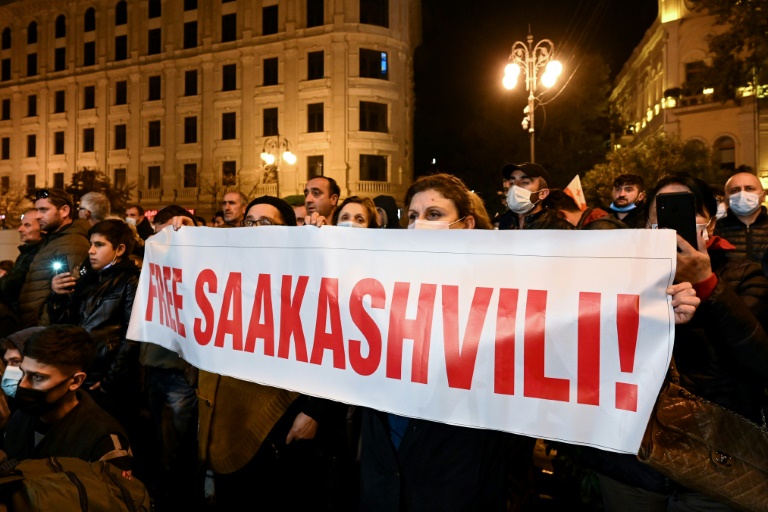Tens of thousands rallied Monday in Georgia demanding the release of jailed opposition leader and former president Mikheil Saakashvili, who has been on hunger strike for several weeks.
Saakashvili, who served as president between 2004 and 2013 and is now the country’s main opposition leader, was arrested on October 1 on his return from exile in Ukraine.
He has refused food for 39 days to protest his imprisonment, which he says is politically motivated.
His jailing has exacerbated a political crisis that has gripped Georgia since last year, after the opposition denounced fraud in parliamentary elections won narrowly by the ruling Georgian Dream party.
The flamboyant pro-Western reformer’s arrest provoked the largest anti-government demonstrations Georgia has seen in a decade.
Chanting Saakashvili’s name, some 40,000 demonstrators flooded on Monday evening the central Freedom Square in the Georgian capital Tbilisi.
The protest came shortly after Saakashvili was controversially moved to a prison hospital, which, rights officials say, fails to ensure his proper treatment.
“A mass, permanent protest movement begins in Georgia and will not stop until Mikheil Saakashvili is set free and snap elections are called,” Nika Melia, the chairman of Saakashvili’s United National Movement party, told the crowd.
“We will not disperse, our protest will be relentless and peaceful, we will not let the regime to provoke us to a civil confrontation.”
Protesters then marched through downtown Tbilisi towards Prime Minister’s office, vowing to blockade the building.
Prime Minister Irakli “Garibashvili will not be able to leave or enter his office,” Melia said.
The pro-opposition Mtavari TV station aired footage of hundreds of riot police being deployed outside government buildings.
– ‘Sentenced to death’ –
Earlier on Monday, Georgia’s penitentiary department said in a statement: “In order to prevent the worsening of the health condition of Mikheil Saakashvili and because of an increased risk to (his) safety, he was transferred from prison number 12 to medical facility number 18 for inmates.”
On Monday morning, doctors who examined Saakashvili said he was “at high risk of multi-systemic complications and needs to be urgently treated in a high-tech clinic.”
Georgia’s rights ombudswoman Nino Lomjaria said the prison hospital failed to meet the doctors’ criteria.
Referring to plans to move him to a prison hospital, Saakashvili earlier on Monday said the move would be a death sentence.
“When Georgia’s parliament abolished the death penalty on my initiative (in 1998), I couldn’t have imagined that years later I would be sentenced to death in Georgia,” he said in a statement.
Doctors have said Saakashvili faces an imminent risk of death as he has an underlying blood disorder that makes his hunger strike particularly dangerous.
Saakashvili’s lawyers have expressed concerns that his “security will not be guaranteed in the prison hospital where convicted criminals are employed as paramedics.”
The independent Pirveli TV channel reported that inmates in the prison hospital staged so-called “noise riot,” shouting insults at Saakashvili who has led a relentless campaign against organised crime during his tenure as president.
On Saturday, Saakashvili supporters set up around a dozen tents outside the prison where he was being held, to seek his hospitalisation in a civilian clinic — as advised by medics — rather than in a prison hospital.
Prime Minister Irakli Garibashvili sparked an uproar recently by saying that Saakashvili “has the right to commit suicide” and that the government had been forced to arrest him because he refused to quit politics.
Critics have accused Georgian Dream of using criminal prosecutions to punish political opponents and journalists.










